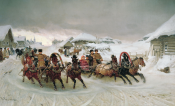
Presidential Library tells about Maslenitsa traditions in Russia
This year, the Maslenitsa Festival, which symbolizes the transition from winter to spring, will take place from February 24th to March 2nd. People have been celebrating Maslenitsa for centuries. For Christians, it is a double celebration: it is both a spring holiday and the last week before Lent.
To learn more about how one of Russia's most beloved holidays was celebrated, read rare publications available on the Presidential Library's portal. Russian historian, ethnographer, and folklorist Ivan Snegirev called Maslenitsa "a riotous holiday" in his book, Russian Folk Holidays and Superstitious Rituals, published in 1838. During this festival, people eat cheese and eggs for seven days before Lent begins, and abstain from meat.
One of the foreign writers who has lived in Russia has said the following about this holiday: Maslenitsa is named so because Russians are allowed to eat butter during this week. During Lent, they use hemp instead of butter in dishes. Maslenitsa starts eight days before Lent, at a time when everyone should be preparing with heartfelt repentance to contemplate the suffering of Christ.
These days, pancakes play a major role, as they are baked throughout the week. They can be found everywhere, and people are invited to enjoy them.
In different regions of Russia, the celebration of Maslenitsa has its own customs and traditions. For instance, in Arkhangelsk, a bull is driven around the city on a large sledge, pulled by several dozen horses, and connected to other sledges.
During Maslenitsa week in Yaroslavl, in addition to enjoying pancakes and riding slides, there is also a tradition of singing Kolyada, which is typically sung in Russia on Christmas Eve.
Jacques Margeret, a French traveler who wrote valuable accounts of the Russian state in the early 17th century, described the holiday as follows: During Shrovetide, Russians visit one another, exchange kisses, say their goodbyes, and reconcile if they have quarreled.
More information about Maslenitsa traditions can be found in Ivan Bozheryanov's essay How the Russian People Celebrated and Celebrate Christmas, New Year, Epiphany, and Maslenitsa (1894), published in Notes on the History of His Imperial Highness, the Blessed Sovereign, Tsarevich, and Grand Duke Paul Petrovich, Heir to the Throne of Russia, by Alexander Tereschenko in his book The Life of the Russian People.
The Presidential Library's collection also contains archival files from the Imperial Theatres Directorate related to the celebrations of Maslenitsa in St. Petersburg and Moscow during the 19th and early 20th centuries. These documents reveal the charitable traditions associated with Lent and Maslenitsa week. They include permission to hold morning performances all week during Shrovetide, as well as cases from 1898 to 1903 related to free performances for students and pupils at educational institutions. There is also a case documenting the holding of an art evening or masked ball on the first day of Maslenitsa at the Mariinsky Theatre in St. Petersburg and the Bolshoi Theatre in Moscow.

